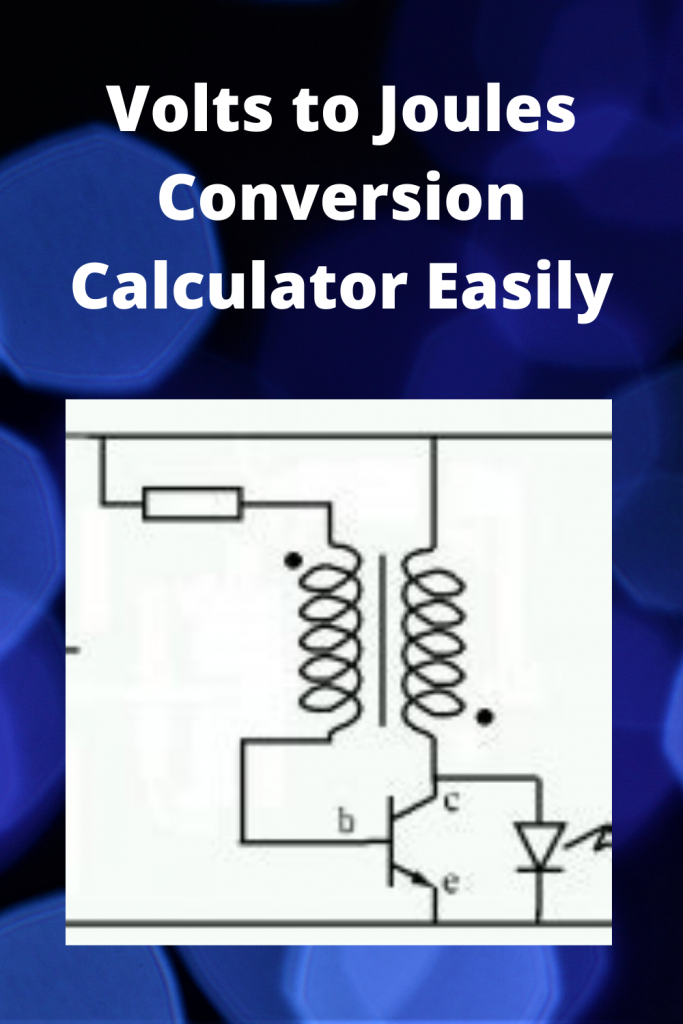Volts to Joules Calculator
Wondering how you can convert those volts (V) into Joules (J)? Well, you to understand and incorporate various physics concepts.
Note that volts (V) measure the electrical capacity of an appliance, whereas Joules (J) typically measure energy. Electrical capacity and energy are two different components, and their formula-calculations differ.
However, using the substitution of various formulas, you can come up with the right calculation to use in this conversion.
Let’s look into some of the tips you require in the understanding conversion of Volts (V) to Joules (J).
Definition of Each Element of the Calculation
Volts (V) represents the electromotive force (emf), hence emf=voltage.
The formula for calculating voltage is ohms, resistance, multiplied by the current in the circuit, measured in amperes (voltage=ohms*amps).
One volt (V) is the standard unit of measurement, measuring the potential difference that can sustain a one-ampere (A) current through a circuit of one-ohm.
An ampere (A) refers to the unit used to measure the electric current, whereas ohms measure the electrical resistance between the two points of the conductor.

You can measure the voltage of your electrical appliance using a voltmeter.
Joules represent the largest units of energy, named after James Joule, abbreviated as ‘J.’ A joule is the international standard unit of measurement for work or energy.
There are multiple formulas used to calculate it, for instance, work=force*distance and
Energy = power * time.
One joule refers to the measure of the energy required to move a one-kilogram object through a distance of one meter, using a one-newton force.
A joule also applies to the energy generated as heat when a current of one ampere passes through a resistance of one ohm for a second.
What is the Formula?
Substitution is the best way to come up with the right formula for this calculation.
The formula for conversion of volts to joules is electrical charge in coulombs (C), multiplied by voltage in volts (V). Typically. 1ev=1.6*10^-19 Joules (J)
How to Do the Calculation
Since the energy in Joules (J) equals the voltage (V) multiplied by the electrical charge (Q), measured in coulombs (C), the calculation is straightforward.
E = Q * V, which you can substitute as.
Joules = Coulombs * Volts
Enter the voltage in Volts and charge in Coulombs and calculate.
For instance, 10 volts running through a 10 Coulomb charge, will give you 100 Joules (J)

How Many Volts Is 1 Joule?
Voltage refers to an electric pressure that pushes electrons in one direction, commonly referred to as electric tension or potential difference.
Energy is measured in Joules and work in Joules; to convert voltage to joules use V = E/C as the formula.
How do you convert volts to joules?
Volts (V) and joules (J) are two different units of measurement used to represent various aspects of electricity. Voltage refers to electromotive force (emf) in an electric circuit while joules measure how much energy is being used to move electrons through wires. While these measurements don’t directly correspond, they can be converted using various formulas.
Converting from volts to joules is simple: energy in joules equals voltage multiplied by electrical charge measured in coulombs. A online calculator makes this conversion even simpler: simply enter voltage and charge amounts before clicking the “calculate” button for instantaneous results.
One joule measures the amount of energy it takes to move one kilogram of electric charge over one meter, or to convert 100 watts of power into heat within one second. It was named for James Prescott Joule, an English mathematician and physicist renowned for his studies on heat, friction, energy conversion and transference issues.
Volts measure potential energy, while joules represent actual energy. When working with electrical devices, volts are usually measured in amp-hours rather than joules because most energy dissipated as heat. To accurately assess how much energy a device provides it’s essential to understand its conversion between joules and volts; for instance, batteries rated 12V will typically dissipate one joule every second as heat; over time this energy dissipation causes significant losses versus its published ampere-hour rating; you need an understanding of both terms to accurately assess what you are purchasing from retailers or who else you buy from when buying online or when purchasing offline from retailers versus ampere-hour ratings published online.
What is 2 volt in joule?
The joule is the unit of energy. It measures how much work is done when a charge moves from one point to another and transfers energy. As more charges pass from point A to B, more energy is released in the form of heat or light; this potential difference between two points is measured in volts (V). 1 V equals 1 J.
Volts measure the difference in potential between two points within an electrical circuit or battery. They’re also commonly referred to as electric potential energy and expressed in Joules per Coulomb (J/C). Voltage serves as an indication of how much energy a battery contains; as more volts it contains, more power it can deliver.
Volt amperes (VAs) are used to measure voltage. One VA corresponds to one current passing through a wire per second. As voltage levels increase, more current can flow freely along the wire as potential differences increase between its two points in the wire.
Converting volts to joules is easy using our online calculator; just enter in your voltage and charge, and it will calculate joules automatically. Or download our handy app which automatically converts between many popular electrical units including volts-joules! Both Android and iPhone users are supported.
Can volts be measured in joules?
Volts are used to measure the potential difference between two points in an electric circuit. They are defined as voltage that can sustain one amp of current for one second over resistance of one ohm, making this measurement easy and accurate. Voltage can be measured by connecting wire points and measuring current flowing through them; once that data is available, its potential energy can be calculated by dividing total current by number of electrons passing each point each second; this process is known as joule-volt relationship and it plays an essential part of understanding electricity and its inner workings.
The joule is the SI unit of energy measurement, named for James Prescott Joule. This unit of measurement represents the amount of energy transferred or taken away from an object when one newton of force acts upon it for one meter. Energy can also be measured in kilograms and pounds but joules remain a more popular measure in everyday life.
Volts and joules share an intricate relationship, often being used interchangeably in various contexts. A joule measures electrical energy while the voltage refers to potential energy for electrons; together they make up Electron Volt-Joule (EV-J) units of energy commonly seen in electronics applications.
Volts and joules are related, since an electron’s voltage relates directly to its energy. To calculate this ratio simply multiply its voltage with its electric charge – measured in coulombs. You can use our Joules to Volts calculator to quickly generate this figure by inputting both values. This provides us with the total energy transmitted in an hour by an electron; and can easily be converted to watts by multiplying by its electrical power factor.
Is 1 volt equal to 1 joule?
Volts and joules are two key units of energy used in electrical circuits. Volts measure the electric potential difference between two points within a circuit while joules measures how much energy is necessary to move that potential difference.
Volts and joules have an inverse proportional relationship; one volt equals one joule. Joules are the standard unit of energy in the International System of Units (SI), and one joule corresponds to the energy expended when an force of one newton acts upon an object over a distance of one meter.
Voltage can be understood as a force that pushes electrons apart, with higher voltage levels translating to increased pressure on these electrons and charge moving down wires, motors or through any device that requires current for operation.
To calculate the voltage of a wire, the formula V = E/Q should be used. This essentially states that voltage equals energy in joules divided by electrical charge measured in coulombs; more energy required to move specific amounts of charge requires greater voltage as more energy must be expended on that task.
Conclusion It is crucial to comprehending the relationship between joules and volts for understanding electricity. Once you understand their interactions, then you can better grasp how current works and its measurement; for instance a 2-volt battery should produce 1 watt in one second.
How many joules is a 12 volt battery?
A 12-volt battery provides 12 joules of energy for every coulomb of charge that passes through it, since 1joule equals 1volt of potential difference.
Volts measure the electric potential that exists between two points in a circuit and can be expressed either as voltage per second or centigrade; regardless of their measurement system used to do this, volts provide an indicator of energy transferred between these points – the higher their number is, the greater its potential energy is.
One volt measures the electric potential difference created when one electron (1.6×10-19C) traverses one coulomb of difference in potential difference; thus it equals 1 joule.
Joules are SI units for both power and work. Originally named for James Prescott Joule (an English mathematician, physicist, and brewer), one joule represents the amount of energy necessary to perform one watt of work for one second; batteries produce multiple joules per hour hence why batteries are often measured using ampere hours rating systems.
When batteries are rated in joules, this indicates they contain enough potential energy to power a lightbulb for one hour of continuous usage. To calculate this figure, multiplying volts average with ampere hours capacity, then dividing by the number of seconds in an hour to get their rating; most buyers look at this value when making their choice for new or replacement vehicle batteries.
Volts to Joules Calculator
Tips to use, During the calculation
Note that when the potential difference in a circuit is zero, no charge will flow through that circuit.
All electrical appliances require a potential difference for a charge to flow through. Too much voltage can cause overheating an electrical device.
Understand how you can substitute various formulas to find the calculation units you need.
For instance, you might have an electrical charge, current, and resistance. In such a case, you can use the formula for calculating the voltage first, which is (Voltage = Resistance * Current), before proceeding to find the energy.
To sum up, you can conveniently use electrical conversions calculators to convert volts to joules. You only need to enter the charge (C), and the voltage (V) then calculate.
Familiarize yourself with multiple physics concepts to avoid confusion during these conversions.
Related Articles
